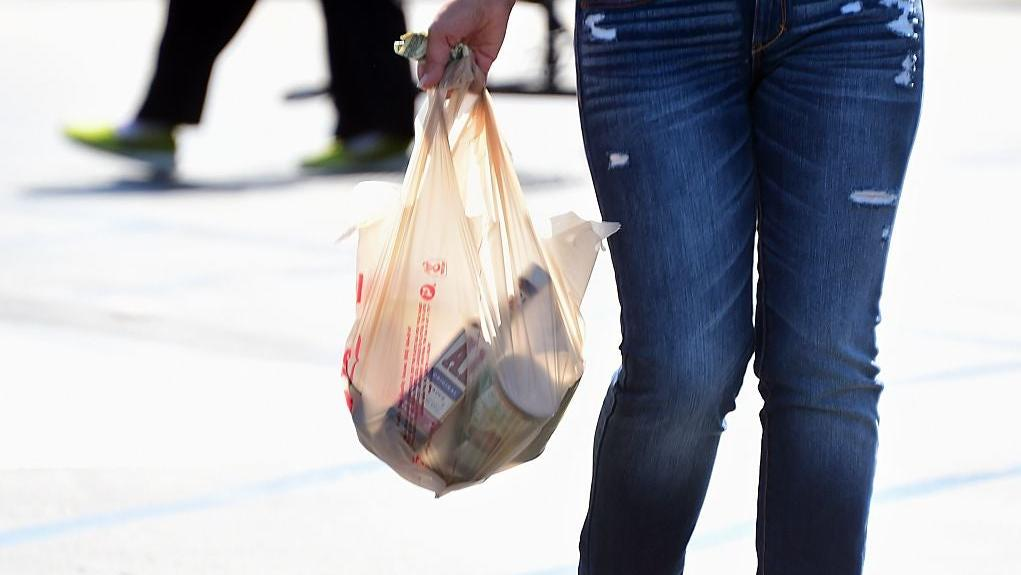Grocery Bag Bans Wreak Havoc In New Jersey
Other states have banned bags, but no one’s done it quite like the Garden State.
New Jersey's bag ban went into effect in May. Since then, headlines about the mere act of grocery shopping in New Jersey have been stacking up.
There are no bags. People are stealing shopping baskets. Shopping baskets are going to get taken away. People are buried in piles of reusable bags. What should we do with all these reusable bags? Legislators are considering undoing part of the bag ban altogether.
New Jersey, are you okay?
According to the Surfrider Foundation, 500 ordinances regarding plastic bags have been passed in 28 states, and nine states, including New Jersey, have banned them altogether. While growing pains have accompanied bag bans before, no one's expressing that pain quite like New Jersey.
The key to why that is, other than perhaps New Jersey's engrained personality, may be that for most grocers, the ban involved paper bags, too. New Jersey's law banned all "single use" bags, paper or plastic, for stores exceeding 2,500 square feet. That has led to a spiral of unintended consequences that seem to be a case study in what can go wrong with bag bans.
Grocery store shopping baskets
In July, a flurry of headlines hit the New Jersey news about how shopping baskets were going missing across the state. Many of those news stories were laced with warnings: Stop taking the baskets, or we'll take away the baskets for good.
"They are just disappearing," Louis Scaduto Jr., chief executive officer of Middletown-based Food Circus Super Markets, told NorthJersey.com. "I may actually have to just do away with them soon, can't afford to keep replacing them."
The crux of the shopping basket stories were that people were forgetting their reusable bags and, rather than purchasing one in the store, were leaving with the shopping basket, treating it a their reusable bag.
Reusable grocery bags
Though we haven't seen a lot of reports of people with a house full of stolen shopping baskets, there have been a flurry of reports about people with sizable piles of reusable bags. A New York Times article earlier this month featured several New Jerseyans who have ended up with huge numbers of reusable bags and aren't sure what to do with them. One person has 101 bags and might sew them into curtains. Another resident has 89. And counting.
A reusable bag made from recycled plastic bags needs to be used 11 times to pay out on the environmental impact of making it. Which isn't such a heavy lift if you only have a few of them in your possession. But 101? I'd get to sewing those curtains, too.
Why are all these reusable bags stacking up? Those who order groceries to be delivered, something that became more common during the pandemic and is a lifeline to those who can't make it to the grocery store, are now receiving their groceries in reusable bags. Because those groceries come from a store that is over 2,500 square feet, both plastic and paper bags are banned.
The trouble is, the grocery store can't accept those reusable bags back once they've entered someone's home. "We've had customers come in with stacks of bags 30, 40 deep like, 'Here can you please reuse these?' And we can't," Chris Mentzer, director of operations at Rastelli Market Fresh in Marlton, told ABC 6 Action News in Philadelphia.
The same news story recommends those with too many bags donate them to the food bank. Food banks have until November 4 to stop using plastic bags themselves. Community FoodBank of New Jersey even created a tool to help people figure out where they can donate their bags.
Changing the grocery bag laws
This week, it was reported that some legislators are considering tweaking the law in a way that might help alleviate at least one of the problems New Jerseyans are dealing with. New ideas for how to deliver groceries are being explored, including cardboard boxes, and, yes, paper bags.
This isn't the first time a bag ban law has been tweaked after going into effect. In 2015, Chicago lawmakers banned thin plastic bags from stores. In response, stores started using thicker plastic bags, undoing any good that losing the thin bags achieved. Lawmakers came back to the table in 2016 to require a 7-cent charge for each bag used, and that got people on board. Suddenly, reusable bags were all the rage.
"The painful experience of loss is more effective at changing habits than a positive gain," said a 2019 Politico story on the subject. The story explains that surveys conducted by Tatiana Homonoff, an assistant professor of economics and public policy at New York University, found that customers said they wouldn't bring a reusable bag if it meant they'd save a nickel, but they would bring one if they were going to be charged a nickel.
The changes New Jersey lawmakers are now considering to grocery delivery receptacles doesn't seem to address the shopping basket problem, though. Taking a note from Chicago, can we expect a fee to use baskets in the future, or, at least, to take them out of the store?
